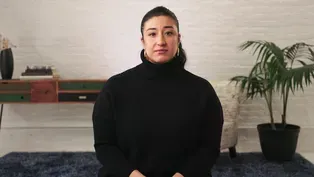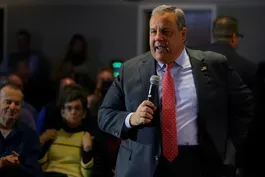
LA mayor on her plan to counteract increase in homelessness
Clip: 6/6/2023 | 8m 53sVideo has Closed Captions
Los Angeles mayor discusses strategy to counteract alarming increase in homelessness
Los Angeles is home to the country’s largest homeless population and new Mayor Karen Bass promised solutions upon entering office in December. Last month, she signed a $13 billion city budget with 10 percent of it dedicated to addressing the problem. Much of the new investment aims to house the homeless and clear street encampments. Geoff Bennett discussed the initiative with Mayor Bass.
Problems with Closed Captions? Closed Captioning Feedback
Problems with Closed Captions? Closed Captioning Feedback
Major corporate funding for the PBS News Hour is provided by BDO, BNSF, Consumer Cellular, American Cruise Lines, and Raymond James. Funding for the PBS NewsHour Weekend is provided by...

LA mayor on her plan to counteract increase in homelessness
Clip: 6/6/2023 | 8m 53sVideo has Closed Captions
Los Angeles is home to the country’s largest homeless population and new Mayor Karen Bass promised solutions upon entering office in December. Last month, she signed a $13 billion city budget with 10 percent of it dedicated to addressing the problem. Much of the new investment aims to house the homeless and clear street encampments. Geoff Bennett discussed the initiative with Mayor Bass.
Problems with Closed Captions? Closed Captioning Feedback
How to Watch PBS News Hour
PBS News Hour is available to stream on pbs.org and the free PBS App, available on iPhone, Apple TV, Android TV, Android smartphones, Amazon Fire TV, Amazon Fire Tablet, Roku, Samsung Smart TV, and Vizio.
Providing Support for PBS.org
Learn Moreabout PBS online sponsorshipGEOFF BENNETT: Los Angeles is home to the country's largest homeless population.
The city's new mayor, Karen Bass, promised solutions upon entering office back in December.
Late last month, she signed a $13 billion city budget, 10 percent of it dedicated to addressing homelessness.
Much of the new investment is set aside for an initiative called Safe Inside, which aims to house the homeless and clear street encampments, Los Angeles Mayor Karen Bass joins us now.
Welcome to the "NewsHour."
KAREN BASS (D), Mayor of Los Angeles, California: Thank you.
Thanks for having me on.
GEOFF BENNETT: Let's talk about your plan, your strategy to confront the homelessness crisis.
This program, Inside Safe, has moved more than 1,200 homeless people off the streets out of encampments into interim housing.
What's the plan to make sure that those folks and others find their way into permanent housing?
KAREN BASS: Well, absolutely.
And thank you for raising the issue.
Los Angeles is really the epicenter.
We have over 40,000 people sleeping in tents around the city, and so getting them off the streets immediately, putting them in interim housing, which right now are motels and hotels, addressing why they were unhoused to begin with, and then moving them on to permanent supportive housing.
And we are having challenges doing that.
We actually have vacancies in some of our permanent supportive housing.
But we're dealing with bureaucratic barriers, and we're trying to address those.
And those barriers are on a federal level, on a county and a city level.
GEOFF BENNETT: So often, the political solution to homelessness is to make it invisible, to push people into places where they can't be seen, to clear encampments.
How is your strategy different from that approach?
KAREN BASS: Well, it's completely different, because we're not just pushing them away.
We are getting them housed, with the commitment to address the underlying causes, as well as to put them in permanent supportive housing.
And so what has happened in the past is that the priority has been to clean the streets, which is something that absolutely needs to be done, but to move them on.
And that doesn't do anything.
And when you have reached critical mass, like we have in Los Angeles, you can't hide 40,000 people.
And so that's why I ran.
That is my commitment.
That is, on day one, I declared a state of emergency, because I think we have an emergency in Los Angeles; 2,000 people died in these tents last year; 22 people died in the first three months of this year on our metro line, at the subways, because -- and that's a phenomena that I know happened around the country, where people who were unhoused started living in subway stations when people were not riding the trains.
GEOFF BENNETT: People often fall into homelessness faster than the system can catch them and help them.
Los Angeles -- the social services system in Los Angeles has a number of gaps.
There is a major affordability crisis, as you well know.
How do you address this urgent need, when it takes time to build or acquire housing for folks, and it takes time to roll out new social services?
KAREN BASS: And you know what?
You are so right.
My biggest concern right now is that, since the COVID protections, like the eviction moratorium, the rental assistance and all of that, since those programs have gone away, I'm actually worried that we're going to experience another increase in homelessness in Los Angeles.
At the end of the day, there has to be a comprehensive approach.
We need to prevent homelessness to begin with.
So, for example, our City Council passed tenant protections.
But we need to make sure that the public knows about that.
So we're doing grassroots outreach, as well as mainstream outreach, and then, again, putting people into temporary housing, which are hotels and motels.
One of the things that we have not encountered really at all are people refusing the housing.
And that was one of the biggest myths around, that people are on the street because they choose to be there, because they're all strung out on drugs.
As a matter of fact, we have had the opposite problem.
When we go to move people out of an encampment, we plan for 20 people, and the day that we're moving, folks, 30 people show up.
So we have learned to rent additional rooms.
Now, we have had a few examples of people refusing, but it has been extremely rare.
GEOFF BENNETT: In your inaugural speech, you talked about how you were raised in Los Angeles and how your father was able to own home, raise a family on a single income.
He worked for the U.S.
Postal Service.
That version of L.A. is unrecognizable now.
That dream is so far out of reach for so many people.
Big picture, beyond the homelessness crisis, what is your vision for the future of housing in Los Angeles?
KAREN BASS: Yes, you are absolutely right.
And let me just put some numbers to that.
I think, if you went to the toughest neighborhood in town, you are not going to find a house below $400,000.
A million-dollar home in Los Angeles is not necessarily a mansion at all.
And so the only solution to that is to massively increase the supply.
And one thing that Angelenos -- it's a cultural shift for us.
And that is to move up, because we are a city that is spread out with single-family homes.
And so now taking a second look at our commercial areas, taking a second look at outdoor malls that are underperforming, so we have to change some of our cultural norms here in the city in order to accommodate -- 500,000 units is what we need in the next 10 years.
GEOFF BENNETT: How do you do that?
How do you change the minds of residents who don't want multifamily housing built in their neighborhoods?
KAREN BASS: Well, in one of the neighborhoods where they are the most resistant, they actually support the idea of housing on the commercial strips?
So, what I believe is that this problem has become so massive in Los Angeles that, a few years ago, where people who would have said, not in my neighborhood under any circumstances, are now going, well, I mean, what's my choice, on the streets or in housing?
Because, in addition to tents, we also have a terrible problem with recreational vehicles and people living in cars.
And so it's different forms.
But, at the end of the day, it's all homelessness.
GEOFF BENNETT: I'd like to ask you about policing while we have you because in -- over the last four years, the Los Angeles Police Department has been hemorrhaging officers, down 1,000 officers.
The department has had to ask former officers to come out of retirement.
How will you recruit and retain officers, while placing a premium on quality, not just quantity?
KAREN BASS: Well, you are so right.
It has to be on quality.
And, in my budget, I am calling to expand the police department, to offer signing -- signing bonuses, to offer raises to officers who've been there for a few years.
And we have taken a member of the police department and placed the individual in the personnel department, because one of our problems -- it's not just a recruitment problem.
It's a problem with the bureaucracy in City Hall that it takes so long to go through the hiring process.
So, we are absolutely trying to address that.
Now, in addition to that, I am also very, very committed to permitting -- to preventing crime in the first place.
So, we are opening an Office of Community Safety that's going to focus on unarmed and alternative responses, especially to calls for mental health crises.
So there is a variety of ways that we are approaching this problem.
My number one job as mayor is to keep the city safe.
GEOFF BENNETT: Throughout your political career, you have been an activist.
You have served as speaker of the California State Assembly.
You have served in leadership roles in the U.S. Congress.
You have tried to effect change at different levels of government in different capacities.
What is different and distinct about being mayor?
KAREN BASS: Well, I will tell you, everything.
(LAUGHTER) KAREN BASS: But what probably what I enjoy the most is the instant gratification, where you're working with legislation, which I also enjoyed very much, but it's 30,000 feet up and it takes years.
To be able to go to a person in a tent and get them out of that tent and put them in a motel on the same day, it's -- that brings me tremendous joy, that you can see the change that you are leading in happen right there at the moment.
GEOFF BENNETT: Karen Bass is the mayor of Los Angeles.
Thanks so much for your time.
We appreciate it.
KAREN BASS: Thanks for speaking with me.
A Brief But Spectacular take on teacher burnout
Video has Closed Captions
Clip: 6/6/2023 | 3m 56s | A Brief But Spectacular take on teacher burnout (3m 56s)
Chris Christie positions himself as alternative to Trump
Video has Closed Captions
Clip: 6/6/2023 | 4m 26s | Chris Christie positions himself as alternative to Trump as he launches presidential bid (4m 26s)
Memphis students build on legacy of R&B and soul artists
Video has Closed Captions
Clip: 6/6/2023 | 3m 19s | Memphis students build on long legacy of R&B and soul artists from their community (3m 19s)
PGA Tour, LIV Golf announce merger following legal battle
Video has Closed Captions
Clip: 6/6/2023 | 6m 31s | PGA Tour and Saudi-backed LIV Golf announce surprise merger following legal battle (6m 31s)
Potential humanitarian crisis following Ukraine dam breach
Video has Closed Captions
Clip: 6/6/2023 | 8m 59s | Experts warn of humanitarian and environmental crisis following Ukraine dam breach (8m 59s)
U.S. sues cryptocurrency exchanges for securities violations
Video has Closed Captions
Clip: 6/6/2023 | 5m 48s | U.S. sues cryptocurrency exchanges Coinbase and Binance for securities violations (5m 48s)
Providing Support for PBS.org
Learn Moreabout PBS online sponsorshipSupport for PBS provided by:
Major corporate funding for the PBS News Hour is provided by BDO, BNSF, Consumer Cellular, American Cruise Lines, and Raymond James. Funding for the PBS NewsHour Weekend is provided by...
















